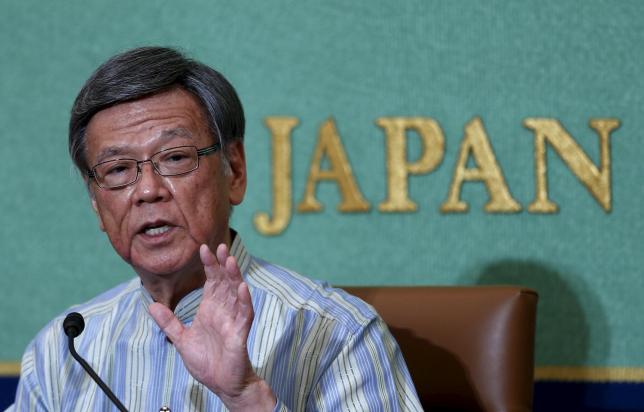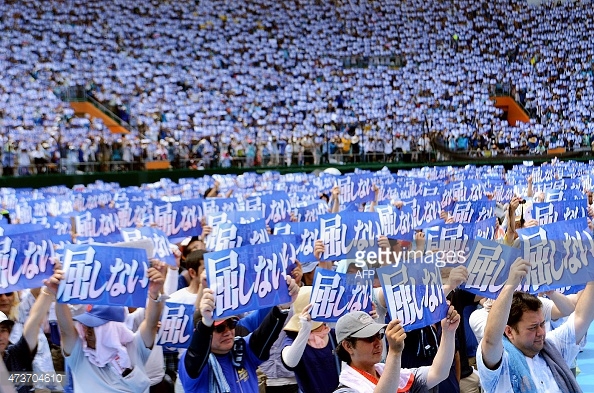Governor of Japan’s Okinawa to Press U.S. for Removal of Base
ASIA--PACIFIC, 25 May 2015
Elaine Lies, Reuters – TRANSCEND Media Service

Okinawa Governor Takeshi Onaga speaks during a news conference on the transfer of a key U.S. military base within the prefecture at the Japan National Press Club in Tokyo May 20, 2015.
Reuters/Yuya Shino
The governor of the Japanese island of Okinawa said on Wednesday [20 May 2015] he will travel to the United States next week to press his demand that a U.S. military base be removed from his island to lighten the burden of a people weary of hosting U.S. troops.
Residents of the southern island have long resented the fact that they not only suffered a devastating land battle during World War Two but also host tens of thousands of U.S. troops and U.S. military facilities on 18 percent of their island’s area.
Takeshi Onaga, who won election last year as Okinawa governor largely on his stand against U.S. bases, has accused Prime Minister Shinzo Abe of looking down on the island and its people.
Onaga and many Okinawans have rejected a proposal to move the U.S. Marines’ Futenma base to another location on the island, instead insisting that it move off altogether.
He told a news conference in Tokyo that he would tell those he meets in Washington that ignoring the wishes of the Okinawan people would harm the reputation of both countries – especially in Asia, where their alliance is seen as a counter to the growing influence of China.
“Unless we make the alliance something with dignity and pride, with both Japan and America deserving of respect, I don’t believe that the economy in Asia will grow more stable,” Onaga said.
“If this issue is dragged out a lot more it’ll affect Japan’s dignity,” he said. “A country that wants to be a leader of Asia, a leader of the world … well, if they can’t protect human rights, equality and democracy for their own people, I don’t think they can really be a leader.”
The United States and Japan agreed in 1996 to close the Futenma base, located in a populous part of the island.
But plans to move it to a new site have stalled in the face of opposition from residents, many of whom associate U.S. bases with noise, pollution and crime.
Some 35,000 Okinawans gathered on the weekend to protest against the move of the base to land to be reclaimed near the town of Henoko in the north of Okinawa, saying it should be moved off the island.
Anger has risen since the fatal crash of a U.S. tilt-rotor Osprey aircraft in Hawaii on Sunday. The Ospreys, loathed for their noise, are set to be deployed at the Henoko base.
DISCLAIMER: The statements, views and opinions expressed in pieces republished here are solely those of the authors and do not necessarily represent those of TMS. In accordance with title 17 U.S.C. section 107, this material is distributed without profit to those who have expressed a prior interest in receiving the included information for research and educational purposes. TMS has no affiliation whatsoever with the originator of this article nor is TMS endorsed or sponsored by the originator. “GO TO ORIGINAL” links are provided as a convenience to our readers and allow for verification of authenticity. However, as originating pages are often updated by their originating host sites, the versions posted may not match the versions our readers view when clicking the “GO TO ORIGINAL” links. This site contains copyrighted material the use of which has not always been specifically authorized by the copyright owner. We are making such material available in our efforts to advance understanding of environmental, political, human rights, economic, democracy, scientific, and social justice issues, etc. We believe this constitutes a ‘fair use’ of any such copyrighted material as provided for in section 107 of the US Copyright Law. In accordance with Title 17 U.S.C. Section 107, the material on this site is distributed without profit to those who have expressed a prior interest in receiving the included information for research and educational purposes. For more information go to: http://www.law.cornell.edu/uscode/17/107.shtml. If you wish to use copyrighted material from this site for purposes of your own that go beyond ‘fair use’, you must obtain permission from the copyright owner.

One of the main origins of this issue may be attributed to this:
Quote:
On September 20, 1947, Hirohito conveyed to MacArthur’s political adviser, William J. Sebald, his position on the future of Okinawa. Acting through Terasaki, his interpreter and frequent liaison with high GHQ officials, the emperor requested that, in view of the worsening confrontation between the Soviet Union and the United States, the American military occupation of Okinawa and other islands in the Ryukyu chain continue for ninety-nine years. Hirohito knew MacArthur’s latest views on the status of Okinawa when he made this offer. [MacArthur had been quoted as saying, “The Ryukyus are our natural frontier” and “the Okinawans are not Japanese.”] The emperor’s thinking on Okinawa was also fully in tune with the colonial mentality of Japan’s mainstream conservative political elites, who, like the national in general, had never undergone decolonization. Back in December 1945, the Eighty-ninth Imperial Diet had abolished the voting rights of the people of Okinawa along with those of the former Japanese colonies of Taiwan and Korea. Thus, when the Ninetieth Imperial Diet had met in 1946 to accept the new “peace” constitution, not a single representative of Okinawa was present.
Unquote:
Quoted from http://faroutliers.blogspot.com/2005/09/attitudes-toward-okinawa-in-japan-1945.html
This issue is not an issue of the Okinawan level; it is a matter of the bilateral relation between the United States and Japan, especially since the 1950s when the Allied Power’s occupation of Japan ended and, at almost the same time, AMPO (= the Security Treaty between the United States and Japan: 1951 – 1960/the Treaty of Mutual Cooperation between the United States and Japan/1960 – ) and SOFA (= the United States and Japan Administrative Agreement: 1952-1960/the Status of Forces Agreement between the United States and Japan: 1960- ) came into effect. The Okinawan people have been sacrificed in that relation over the decades.
In addition, in recent years China began to claim Okinawa as a part of the Chinese territories. See the following articles, for example: “China lays claim to Okinawa as territory dispute with Japan escalates” and “Grow Calls in China to Press Calls for Okinawa”. (http://www.theguardian.com/world/2013/may/15/china-okinawa-dispute-japan-ryukyu and http://www.nytimes.com/2013/06/14/world/asia/sentiment-builds-in-china-to-press-claim-for-okinawa.html?_r=0) As tension grows between China and Japan, China believes that Okinawa, whose US military facilities stock reportedly some 1,200 nuclear warheads, deems dangerous for China.
The security issues in the East Asia are one serious set of issues to be debated. On the other hand, in the international relations as such, the view point of the residents of Okinawa has been neglected for over the decades.
If these security issues are discussed as “peace issues” (not as security issues), another or new perspectives might be discovered. If a meeting for that purpose is to be held, the representative of the Okinawan residents should also be invited to the discussion.